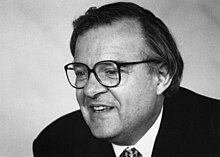Loading AI tools
German economist (1942–2002) From Wikipedia, the free encyclopedia
Rüdiger Dornbusch (June 8, 1942 – July 25, 2002) was a German economist who worked in the United States for most of his career.
Rudi Dornbusch | |
|---|---|
 | |
| Born | June 8, 1942 Krefeld, Rhine Province, Germany |
| Died | July 25, 2002 (aged 60) Washington, D.C., U.S. |
| Nationality | German American |
| Education | University of Geneva (BA) Graduate Institute of International Studies (BA) University of Chicago (MA, PhD) |
| Academic career | |
| Field | International economics |
| Institutions | MIT (1975–2002) University of Chicago (1974–1975) University of Rochester (1972–1974) |
| School or tradition | New Keynesian economics |
| Doctoral advisor | Robert Mundell[1] |
| Doctoral students | Andrew Abel[2] Pedro Aspe Eliana Cardoso José De Gregorio Jeffrey Frankel Francesco Giavazzi Ilan Goldfajn[3] Paul Krugman[4] Maurice Obstfeld[5] Kenneth Rogoff[6] Christina Romer[7] D. Nathan Sheets |
| Contributions | Overshooting model Dornbusch's law |
| Information at IDEAS / RePEc | |
Dornbusch was born in Krefeld in 1942.[8] After completing his secondary education at the Gymnasium am Moltkeplatz, he studied political science at the University of Geneva, and received his undergraduate degree (licence en sciences politiques) from the Graduate Institute of International Studies in 1966.[8] He went on to graduate study at the University of Chicago, receiving an MA in economics in 1966, and a PhD in economics in 1971.[8]
He lectured briefly at the University of Chicago Booth School of Business, before serving as an assistant professor at the University of Rochester for two years; he then returned to Chicago, where he served as a professor of international economics. In 1975, he moved to MIT, where he was appointed an associate professor in the Department of Economics, and was made a full professor in 1984.[8] He stayed at MIT until his death in 2002.[9]
Throughout his career his main focus was on international economics, especially monetary policy, macroeconomic development, growth and international trade. According to some of his students and associates his talent was to extract the heart of a problem and make it understandable in simple terms. For example, he explained fluctuations in prices and exchange rates with great clarity (notably with his overshooting model). He succeeded in making a more realistic model than Mundell–Fleming model with regard to a small open economic system, considering exchange rate expectations.[10] He worked also for the International Monetary Fund, contributing to the development of stabilisation policies, especially for Latin American countries. Along with Sebastián Edwards he coined the term macroeconomic populism. For more than 15 years he served as an associate editor of the Quarterly Journal of Economics.
Together with Stanley Fischer he also wrote widely used undergraduate textbooks.
Seamless Wikipedia browsing. On steroids.
Every time you click a link to Wikipedia, Wiktionary or Wikiquote in your browser's search results, it will show the modern Wikiwand interface.
Wikiwand extension is a five stars, simple, with minimum permission required to keep your browsing private, safe and transparent.